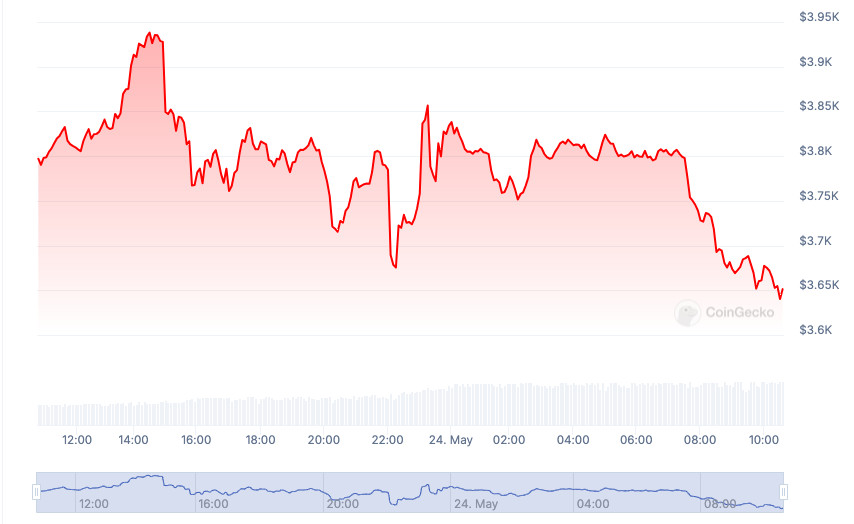Ethereum is facing considerable swings in its value, highlighted by a recent drop after ETF announcement details were not made public.
In Brief
With the SEC's recent decision, Ethereum ETFs are now permitted to be listed and traded on prominent U.S. stock exchanges. This move reveals the complexity of the SEC's regulatory framework surrounding cryptocurrency assets.
The SEC's latest approval allows for the trading of spot Ethereum exchange-traded funds (ETFs). The SEC of the United States has allowed for the listing and exchange of spot Ether ETFs on significant U.S. exchanges. This decision illustrates that the SEC's perspective on cryptocurrency assets is multifaceted and not as straightforward as it initially seems. In this piece, we will delve into the SEC's rationale, address lingering uncertainties, and evaluate potential impacts on the crypto industry.
The SEC’s Analytical Framework
A significant focus of the SEC's evaluation has been on preventing fraudulent and manipulative activities, as mandated by Section 6(b)(5) of the Securities Exchange Act. In January 2024, the SEC reiterated the importance of robust surveillance-sharing agreements with substantial regulated entities relevant to the underlying asset, drawing from its experiences with spot Bitcoin ETF licensure. Interestingly, the Chicago Mercantile Exchange (CME) does not actively monitor the spot Ether markets. This fact raises questions regarding the effectiveness of the CME's surveillance-sharing systems in recognizing and mitigating illicit activities within the spot Ether trading landscape, even as the Ether market itself is regulated.
However, Outlook for Ether ETFs in 2024: A Correlation Analysis by the SEC To tackle this concern, the SEC and the exchanging platforms conducted a meticulous correlation analysis to identify if price movements in the CME's Ether futures market align closely with those in the spot exchanges. If a strong correlation is found, the CME's surveillance could inadvertently highlight theft and manipulation occurring in spot markets, as these activities could sway the prices in the futures market.
This study, which spanned a duration of two and a half years and utilized hourly, five-minute, and one-minute intervals, demonstrated a consistently significant correlation between the CME's Ether futures market and key spot Ether trading platforms.
This empirical evidence led the SEC to a crucial conclusion: potential fraud or manipulation affecting spot Ether pricing would likely also influence CME Ether futures pricing, thereby suggesting that the CME's oversight capabilities could aid in detecting such misconduct.
The SEC’s analysis, The detailed examination of Bitwise's correlation data was also thorough. To reiterate, Bitwise sought SEC approval for its proposed Spot Ethereum ETF, aiming to replicate the asset's price actions without the management costs typically associated with funds. The analysis revealed no significant differences in correlation values between the Ethereum spot market and CME Ethereum futures market, highlighting a strong alignment between the two sectors. Coinbase and Kraken This is a remarkable time for Ethereum and the broader crypto landscape. It's heartening to see Bitwise's correlation analysis taking center stage in the SEC's documentation.
In the SEC document, This disclosure alleviates regulatory concerns regarding market manipulation and highlights the reliability of price discovery processes in the Ether market. The findings from this study, which provide solid empirical evidence that the Ether market behaves similarly to regulated financial markets, could prove vital during the SEC's evaluation phase. Johnsson previously noted that Bitwise Invest delivered the most comprehensive correlation analysis, highlighting that the recent findings reinforce the excellent work Bitwise Invest has accomplished, positioning them as the issuer most aligned with SEC figures.
According to Bitwise, In addition to its investigation, the SEC evaluated the offerings based on Section 11A(a)(1)(C)(iii) of the Securities Exchange Act, which mandates assurances regarding information availability and the maintenance of fair and orderly markets.
Scott Johnsson mentioned The approved Ether ETFs followed these guidelines by incorporating measures such as transparent portfolio holdings, defined surveillance protocols, and trading halt policies. These measures enhance investor protection and ensure market integrity, aligning with the SEC's approach to other approved exchange-traded products (ETPs).
Lingering Questions Following the SEC's ETF Decision
While the SEC's approval represents a significant step forward, it does not fully mitigate the concerns expressed by industry analysts. One major issue revolves around the implications of merging traditional banking with cryptocurrency assets within the broader financial system. Although the SEC acknowledged these concerns, it ultimately concluded that the proposals met the requirements of the Exchange Act.
However, the SEC's response left this crucial topic relatively unaddressed. The inherent volatility of digital currencies like Ether, as well as the potential systemic risks that could arise from their incorporation into traditional finance, necessitate further investigation and regulatory protections.
Moreover, the SEC's ruling did not provide a clear position regarding the essence of Ether itself.
There are those who argue that Ether's decentralized architecture and the consensus mechanism used by the Ethereum network make it less vulnerable to theft and manipulation. Conversely, others raise concerns about the possibility of centralization and manipulation by a select group of validators and developers.
Impact of Ether ETF Authorization on the Crypto Landscape
The approval of spot Ether ETFs is set to have significant repercussions across the crypto sector and traditional finance. By establishing a pathway for regulated investment opportunities in spot Ether, the SEC has made a pivotal move towards incorporating the second-largest cryptocurrency into established financial markets. Some commenters argued This development could draw in institutional investors and spur additional adoption of Ether and the Ethereum platform, potentially facilitating the growth of decentralized applications (dApps) and the wider Web3 ecosystem. However, it also prompts critical questions about the long-term effects of such integration, especially in terms of regulatory oversight and the risks of centralization.
Research firm Second Mountain suggests that initial capital influx in the first week could be monumental, possibly reaching into the billions. For instance, Grayscale's ETHE Ethereum Trust alone manages approximately $9 billion in ETH (around 2.94 million ETH), which can be converted into the ETF without issue. This influx is likely to invigorate the Ethereum ecosystem, potentially boosting the prices of related altcoins.
Since the announcement of ETFs, Ether (ETH) has experienced wild fluctuations; it briefly fell below the $3,500 mark after peaking at $3,950 earlier in the day. Presently, there is no confirmed timeline for the start of ETF trading, which has further introduced uncertainty into price movements.
Nonetheless, this recent ruling creates the potential for a higher price floor for ETH. Although traditional financial institutions are still cautious, there has been a slight uptick in demand within the last 24 hours. With institutional interest on the rise, ETH's price floor is anticipated to increase. However, there remains a possibility that the listing process could extend longer than anticipated, which might amplify market leverage and potentially lead to liquidation scenarios.
While the SEC's clearance of the 19b-4 filings is a notable milestone, it does not give a green light for immediate trading of spot Ether ETFs. The final phase involves the SEC's evaluation and endorsement of each issuer's S-1 registration statement, which outlines critical information regarding the financials, risk parameters, and investment goals of the ETF. For me, the most compelling aspect of this filing is:
According to HalogenCapital, The authorization was granted through delegated authority; thus, we won't witness public commissioner votes on the matter.
However, this also implies that any commissioner (possibly Crenshaw?) has the ability to challenge and call for a review/vote.

Photo: Ether price, 23-24 May, CoinGecko
Approval of Registration Statements
Experts in the industry speculate that this process may take days, weeks, or even months, keeping investors and market professionals in a state of heightened anticipation. The SEC's effectiveness and speed in examining these registration submissions will be scrutinized since any extended delays might undermine the enthusiasm surrounding this landmark decision.
What Can We Anticipate Next From ETH and Regulatory Authorities?
The detailed examination of Bitwise's correlation data has also been a focal point of interest.
Ethereum Experiences Intense Volatility as it Plummets Following Insufficient ETF Announcement Insights – Metaverse Post
The SEC has authorized the trading and listing of Ether ETFs on prominent U.S. exchanges, showcasing the intricate nature of the SEC's stance on cryptocurrency assets.
Ethereum Experiences Intense Volatility as it Plummets Following Insufficient ETF Announcement Insights
Disclaimer
In line with the Trust Project guidelines To enhance your experience in your native language, we occasionally utilize an automatic translation tool. Please bear in mind that these translations may lack precision; hence, read with caution.







